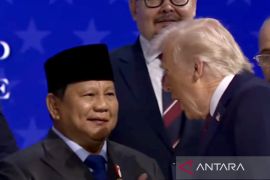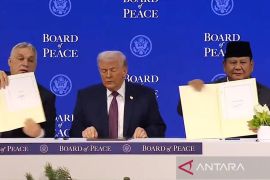Just as Palestine stood with Indonesia in 1944, when Indonesia’s independence was still a fragile dream, today it is Indonesia’s moral duty to stand firmly with Palestine.Jakarta (ANTARA) - Amidst the lively preparations for Indonesia's Independence Day celebrations, another nation is still struggling for its own independence — Palestine, whose bond with Indonesia has often been described as that of brotherhood.
History records that Palestine expressed solidarity with Indonesia even before Indonesia declared independence. Palestine recognized Indonesian sovereignty as early as 1944.
The Grand Mufti of Palestine, Sheikh Muhammad Amin Al-Husaini, together with a wealthy Palestinian merchant, Muhammad Ali Taher, broadcast their people’s support for Indonesian independence through Arabic-language radio and media on September 6, 1944.
Their support did not stop there; both men also actively lobbied sovereign states in the Middle East to recognize Indonesia’s independence.
This moral support became part of a global solidarity network that strengthened Indonesia’s diplomatic standing in the eyes of the world.
Now, it is Indonesia’s turn to uphold that historical memory.
Related news: Indonesia readies Gaza airdrops, peacekeepers, and evacuations
The 1945 Constitution: A Binding Promise
The opening paragraph of the Preamble to the 1945 Constitution declares: “Independence is the right of all nations, and therefore, colonialism must be abolished throughout the world, as it is inconsistent with humanity and justice.”
This principle applies not only to the Indonesian people but to all nations. It mandates that Indonesia adopt an anti-colonial stance in global affairs, including the case of Palestine.
The Preamble thus constitutes a moral promise, one that must be kept not only for Indonesia but also for other nations still shackled by colonialism. Palestine is the most concrete test of that promise.
This constitutional mandate provides both direction and a moral foundation for Indonesia’s role in the international community, which later evolved into the “free and active” foreign policy doctrine — a direct embodiment of the 1945 Constitution.
Related news: MPR praises Prabowo's push for world peace in international fora
Indonesia's Support for Palestine
Indonesia’s consistent support for Palestine is a direct manifestation of this constitutional mandate. Palestine remains under occupation and has not yet achieved full sovereignty.
Indonesia has never established diplomatic relations with Israel, in line with its constitutional principles, and officially recognized the State of Palestine in 1988 after its declaration of independence.
Indonesia has consistently voiced the Palestinian cause in international forums such as the United Nations (UN), the Organization of Islamic Cooperation (OIC), and the Non-Aligned Movement.
Beyond diplomacy, Indonesia has contributed directly to humanitarian efforts.
The Indonesian Hospital in Gaza — built and managed by MER-C with donations from the Indonesian people — stands as a lasting symbol of solidarity. Indonesia also provides emergency aid including medicine, food, tents, and medical supplies.
Capacity building has been another focus: Indonesia offers scholarships for Palestinian students, while also engaging in development cooperation in health, education, and agriculture through the South-South and Triangular Cooperation (SSTC) program.
Most recently, the Indonesian government agreed to send 10,000 tons of rice aid to Gaza and allocate 10,000 to 20,000 hectares of land in Indonesia to be managed jointly with Palestine to ensure food security.
Related news: Indonesia's Baznas delivers aid to Palestinian families in Egypt
Independence for Palestine
Indonesia continues to call on the international community to realize a two-state solution based on international law, the 1967 borders, and relevant UN resolutions.
This call is reinforced by growing global public movements demanding that governments pressure Israel to halt its attacks on Gaza and recognize Palestine as a sovereign state.
Recognition of Palestine is not an act of charity but an obligation under international law. To recognize Palestine is to uphold justice, honor the UN Charter, and balance diplomatic relations.
Only with a strong and united Palestinian state, exercising full control over its land and institutions, can Israel be truly accepted as a peaceful neighbor in a secure Middle East.
Popular pressure and the intensifying Israeli attacks on Gaza have already led several Western nations — including Spain, Ireland, Norway, and Slovenia — to officially recognize the State of Palestine.
France followed by recognizing Palestine at the UN General Assembly in September 2025, with the United Kingdom declaring its intention to do so with certain conditions.
Like a domino effect, other countries — including Canada, Japan, Australia, and New Zealand — are expected to recognize Palestine this September, though the United States has yet to follow.
Countries that have recognized or pledged to recognize Palestine are also pressing their regional associations to act. Ireland, for instance, has urged the European Union to suspend its agreements with Israel and take concrete steps to halt its military actions in Gaza.
France, in partnership with Saudi Arabia, recently convened an international conference to advance the two-state solution, reaffirming that it remains the only path toward sustainable peace and security.
Related news: Indonesia engages in no talks with Israel: Foreign Ministry
Indonesia’s Role Going Forward
Indonesia can further support the Palestinian cause in global forums by intensifying diplomatic lobbying at the UN. This could include garnering support for a resolution modeled on UN General Assembly Resolution 377 A, “United for Peace,” as suggested by international relations scholar Hikmahanto Juwana.
The resolution provides a mechanism for the General Assembly to act when the UN Security Council fails to maintain international peace and security due to a lack of unanimity among its permanent members.
In such cases, the General Assembly may issue recommendations and even propose collective measures to restore peace.
Just as Palestine stood with Indonesia in 1944, when Indonesia’s independence was still a fragile dream, today it is Indonesia’s moral duty to stand firmly with Palestine.
As mandated by the 1945 Constitution: “Independence is the right of all nations, and colonialism must be abolished throughout the world.”
Related news: Indonesia condemns Israel's unilateral Gaza takeover plan
Related news: Indonesia deploys fourth TNI medical team to aid Palestinians
Related news: Indonesia, Peru commit to advancing Palestinian two-state solution
Editor: M Razi Rahman
Copyright © ANTARA 2025











